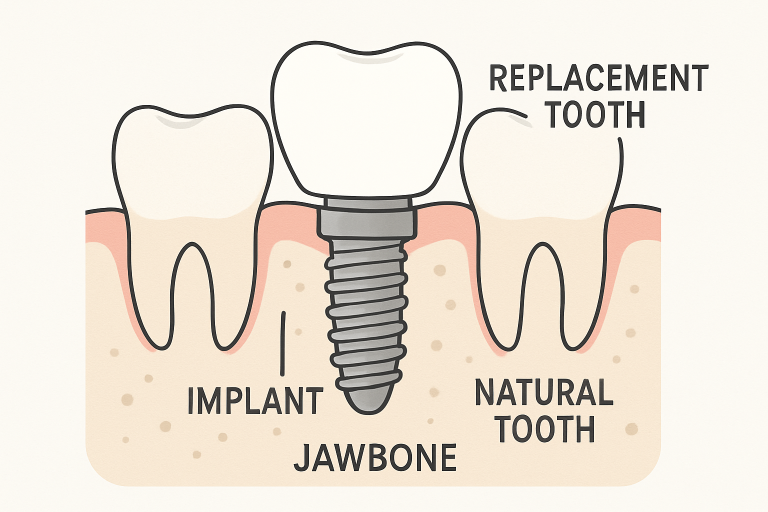Table of Contents
Dental implants have revolutionized modern dentistry by offering a permanent, aesthetically pleasing, and functional solution for individuals with missing teeth. Whether you are considering this treatment for yourself or exploring options for a loved one, understanding the full scope of what dental implants offer is essential for long-term oral health and wellness. If you’re researching options in your area, consider learning more about dental implants Louisville KY to see how this advanced treatment may be the answer.
Unlike conventional dentures or bridges, dental implants anchor directly into the jawbone and integrate seamlessly with your natural smile. The benefits span from improved self-confidence to stronger oral health, making implants a preferred option for many patients and dental professionals alike.
As the popularity of dental implants continues to rise, it’s crucial to understand not just the procedure but also the profound impact implants can have on your bite function, speech, and the overall preservation of your facial structure. By choosing the right restoration technique, you can avoid issues commonly associated with tooth loss, such as jawbone shrinkage and shifting of adjacent teeth.
This guide provides a detailed look at every aspect of dental implants, from their structure to the post-procedure care, risks, and alternative tooth replacement options, so that you can make an informed decision for your oral health.
What Are Dental Implants?
Dental implants are small, screw-like posts, usually crafted from biocompatible titanium, that are surgically embedded into the jawbone. Acting as artificial tooth roots, implants provide a sturdy foundation for custom-crafted crowns, bridges, or dentures, securely anchoring the restoration in much the same way as a natural tooth root.
The implant and bone undergo a process called osseointegration, where the jawbone fuses with the surface of the implant. This integration mimics the stability of natural teeth, supporting comfortable chewing and speaking.

Benefits of Dental Implants
- Preservation of Jawbone Density: Implants stimulate the jawbone, helping to prevent bone loss that frequently occurs after tooth extraction or prolonged tooth absence.
- No Damage to Adjacent Teeth: Unlike bridges, implants do not require grinding down neighboring healthy teeth, keeping them structurally intact.
- Improved Oral Hygiene: Individually placed implants enable easy brushing and flossing, reducing the risk of plaque buildup and subsequent gum disease.
- Restored Chewing and Speech: Implants function and feel like natural teeth, making it easier to eat a balanced diet and speak clearly without slippage or discomfort.
- Longevity: With careful maintenance, implants can last multiple decades—often a lifetime—making them a valuable long-term investment.
The Implant Procedure
The dental implant process is completed over several months and follows a sequence designed for optimal healing and long-term success:
- Initial Consultation: Dentists assess your oral health, bone density, and overall suitability for the procedure through exams and advanced imaging.
- Surgical Placement: The implant post is inserted into the jawbone during a minor surgical procedure. Local anesthesia is typically used to ensure comfort.
- Osseointegration: Over several months, the implant bonds with the surrounding bone, providing a stable and lasting support structure.
- Abutment Placement: Once healed, a small connector, or abutment, is attached, serving as the attachment point for your final restoration.
- Restoration: A custom-made crown, bridge, or denture is fitted to the abutment, blending seamlessly with your natural teeth.
Modern technological advancements, such as 3D imaging and guided implant placement, have increased implant success rates and can further personalize your treatment plan.
Caring for Your Implants
Long-term implant success requires a daily commitment to oral hygiene. Dental implants need the same care as natural teeth to remain healthy and functional:
- Brush your teeth at least twice a day with a soft-bristle toothbrush to remove plaque.
- Floss carefully around the implant daily to prevent gum disease.
- Schedule regular professional cleanings to detect and address any issues early.
- Avoid biting down on ice or hard candy, as these can chip the restoration or overload the implant.
Potential Risks and Complications
While the long-term success of dental implants is high, complications can occasionally arise. Common risks include:
- Infection at the surgical site may require antibiotics or further intervention.
- Injury to nearby nerves, blood vessels, or sinus cavities, particularly with upper jaw implants.
- Implant failure is often related to inadequate bone integration or underlying medical conditions such as uncontrolled diabetes.
- Gum or peri-implantitis is an inflammatory disease that affects the tissues surrounding the implant.
Cost Considerations
The investment in dental implants can be significant, with price points differing based on the number of implants, the extent of preparatory procedures (such as bone grafting), and the provider’s location. While the up-front cost may exceed that of dentures or bridges, the long-term durability and improved quality of life should also factor into your decision. Many patients find that the ongoing comfort, reduced maintenance, and extended lifespan of implants outweigh the initial financial outlay.
Alternatives to Dental Implants
If you are not eligible for dental implants due to insufficient bone, chronic health problems, or other reasons, alternative treatments may include:
- Dental Bridges: Fixed prosthetics that span the gap left by one or more missing teeth, but require the support of adjacent teeth.
- Traditional Removable Dentures: Full or partial prostheses that can restore appearance and function, but may not match the comfort and stability of implants.
- Tooth-Supported Overdentures: Removable dentures anchored to remaining natural teeth for added retention and stability.
Conclusion
Dental implants are a sophisticated, highly successful solution for tooth loss, delivering not only an esthetic advantage but also crucial support for your oral health and confidence. Armed with comprehensive knowledge of the implant process, its benefits, risks, and viable alternatives, you can make a well-informed decision that aligns with your unique dental needs and lifestyle.






